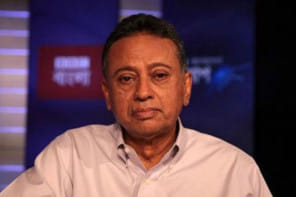‘Will not back down on our rights’

Several thousand women marched in the capital yesterday, demanding that the government act against the threats women and minority communities face and a misinformation campaign against the Women's Affairs Reform Commission.
The government must also take steps against the use of religious values to instil fear, they said.
The demonstrators gathered in front of the Jatiya Sangsad Bhaban on Manik Mia Avenue in the afternoon and then began the "Women's March for Solidarity".
Garment workers, house staff, indigenous and Dalit women, students, teachers, sex workers, and members of the hijra and gender-diverse communities united in their call for justice, dignity, and equality.
The demonstrators demanded that political parties clearly state their policies on the rights of women, workers, and minority communities.
Among their key demands was a mandatory 33 percent representation of women in upcoming elections.
They also urged that the interim government take immediate steps to empower women and marginalised communities through education, healthcare, and economic initiatives.
The declaration was read out by Sharmin Akter, wife of July uprising martyr Mamun Mia; Shamsi Ara Zaman, mother of slain journalist Tahir Zaman Priyo; and Jayanti Chakma, an indigenous community representative.
"Rights are not granted; they must be claimed -- and we are not afraid to claim them," read the declaration.
The programme began with a moving chorus of the national anthem, followed by a range of cultural performances including songs, poetry recital, and theatre performances.
The performances, drawn from diverse traditions, symbolised solidarity.
While Bangladesh has a rich history of women's participation in political and social movements, the promises of the July 2024 uprising are now under threat from patriarchal and reactionary forces, speakers said at the programme.
They said women continue to face daily harassment, exclusion from decision-making, and online abuse, aimed at deterring their political participation.
They also highlighted reports of sudden attacks, disruption of peaceful movements, orchestrated mob violence, moral policing, sexual assault, gang rape, and persistent threats.
Referring to the recent backlash over the Women's Affairs Reform Commission, the speakers said the commission submitted 433 recommendations for reforms. Instead of discussing the recommendations, a certain quarter launched a campaign of misrepresentation and propaganda against the commission members, they said.
"The interim government, established through the sacrifices and bloodshed of countless women during the July uprising, has remained shockingly silent about the ongoing oppression, humiliation, and violence against women.
"Despite heinous attacks on its own appointed commission members, the government has taken no action," read the declaration.
As the commission's recommendations reflected the core issues related to women's equality and empowerment, the campaign to disband the commission is deeply alarming.
"The government's inaction after attacks on its own appointees sends a clear message: even our most fundamental rights will be suppressed through fear and intimidation.
"We are witnessing politics of hatred, threats, and organised violence. Our legitimate demands are being silenced. We ask: whom does the government aim to appease? The extreme majoritarian nationalism and fundamentalism that crush the weak and fear a just society? The farce of democracy and reform that seeks only to preserve inequality? We will not allow this to continue.
"We won't remain silent...We will not back down on our rights."
The declaration also underscored the need for formal state recognition of women in farming and domestic work; highlighted wage disparities and discrimination against indigenous, Dalit, and Harijan women.
It further noted that 96 percent of Bangladeshi women do not own land, the country leads Asia in child marriage, and ranks fourth globally in intimate partner violence. An estimated 97 percent of sexual violence cases -- including marital rape -- go unpunished.
Legal shortcomings and the absence of a unified family law continue to deny women fair rights to property, divorce, and child custody; sex workers do not have civic protection, gender-diverse communities lack legal recognition, and many female migrant workers return home in coffins.
Other demands included fair wages, safe workplaces, union rights, access to education, healthcare, and housing, bodily autonomy, privacy, and justice for survivors of abuse.
Rahnuma Ahmed, writer; Shireen Huq, founding member, Naripokkho, and the chief of the Women's Affairs Reforms Commission; Shaheen Anam, executive director of Manusher Jonno Foundation; Dr Iftekharuzzaman, executive director of TIB; Rasheda K Choudhury, executive director of Campaign for Popular Education; Sheepa Hafiza, rights activist; Shima Moslem, joint general secretary of Bangladesh Mahila Parishad; Dhaka University teachers Gitiara Nasreen and Samina Luthfa, among others, joined the march.
The participants marched from Manik Mia Avenue to Farmgate and then returned to the venue in front of Jatiya Sangsad Bhaban with banners, placards, hand-painted fans, and marching bands.
The slogans were about women's rights, dignity, labour justice, and solidarity with the Palestinian cause.

 For all latest news, follow The Daily Star's Google News channel.
For all latest news, follow The Daily Star's Google News channel. 



Comments